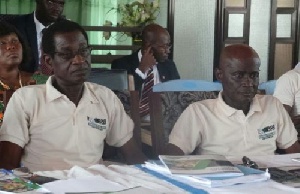Bomosadu Rural Bank Limited at Senase near Berekum in the Brong Ahafo Region has agreed to merge with three other rural banks in the region.
The three are Wenchi Rural Bank at Wenchi; Bomaa Area Rural Bank at Bomaa; and Atweaban Rural Bank at Duayaw-Nkwanta.
The move, is largely influenced by the inability of Bomosadu Rural Bank to the meet the GH¢1million minimum capital requirement by the Bank of Ghana. All rural and community banks (RCBs) were required to raise the said threshold by latest December 31st, 2017. As at June 2018, the bank had mobilised a stated capital of GH¢741,125.
Bomosadu Rural Bank was inaugurated on September 25, 2013, and has since endured a series of operational challenges which have frustrated its growth. Key among the challenges were the mushrooming and subsequent collapse of microfinance institutions and Ponzi schemes that crippled the banking sector in Brong Ahafo.
At the maiden annual general meeting of shareholders held at Senase, owners of the bank unanimously agreed with the Board of Directors that the bank should merge with three sister RCBs to enhance its fortunes. The Board Chairman, Stephen Asante, said the bank had weighed all available options, but considering the turbulent nature of the current banking industry and other dynamics, a merger is the right way to go.
In an interview with B&FT, Martin Amponsah-Nyame – General Manager of Bomosadu Rural Bank, said the four banks will soon forward a proposal on the intended merger to the Bank of Ghana for approval. He revealed that per their resolution, all staff will be absorbed, adding: “The proposed B/A Community Bank will rather expand its operations into green areas to consolidate growth”.
Presenting highlights of the bank’s performance since its establishment, the Board Chairman pointed out that despite numerous operational challenges, it managed to weather the storm to produce somewhat satisfactory results. Total assets, he indicated, diminished from GH¢495,258 in 2014 GH¢414,179 in 2015 – but there has been a turnaround as assets increased to a little over GH¢1.06million by the close of 2017, representing a growth of 114.18%.
Total deposits of the bank increased marginally from GH¢694,575 in 2016 to GH¢754,654 in 2017, indicating a slight 8.36% surge. The young bank has been meticulous with giving out loans, especially when deposit growth has not been inspiring. In 2016, the sum of loans and advances was just GH¢42,220 as compared to GH¢212,952 in 2017 – showing an impressive rise of 404%.
In 2014, the bank made an investment of just GH¢95,441, but in 2015 and 2016 it did blank investments. Subsequently, in 2017, the bank returned to the capital market with a GH¢100,000 investment in Treasury bills and other securities. On the other hand, the five-year-old bank as at the end of 2017 was yet to break-even; it had a loss of GH¢307,561.
Business News of Thursday, 8 November 2018
Source: thebftonline.com

















